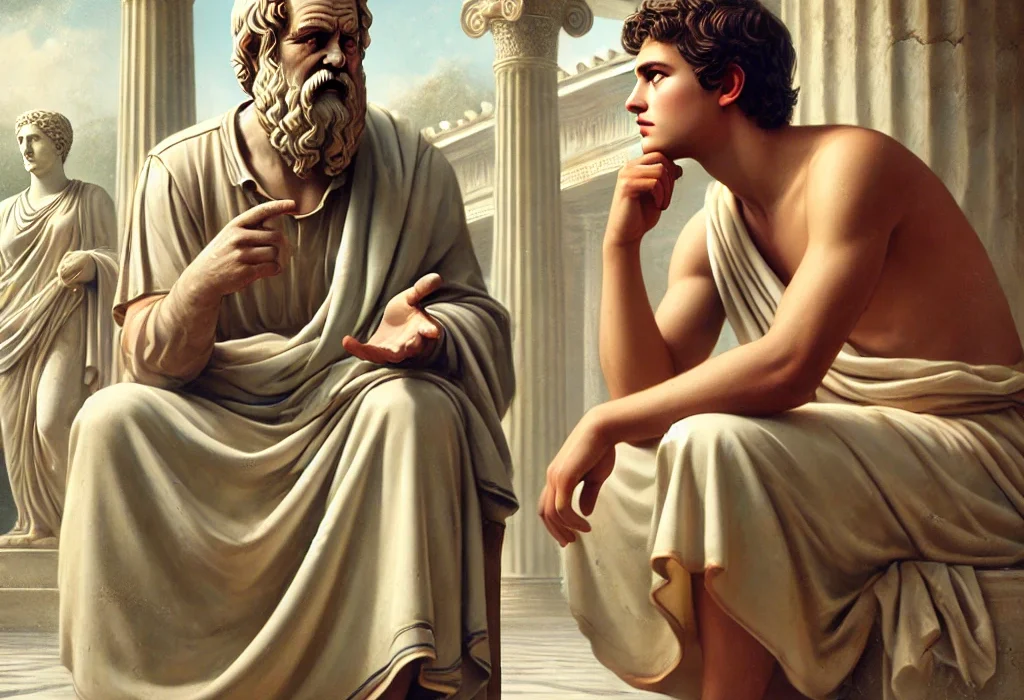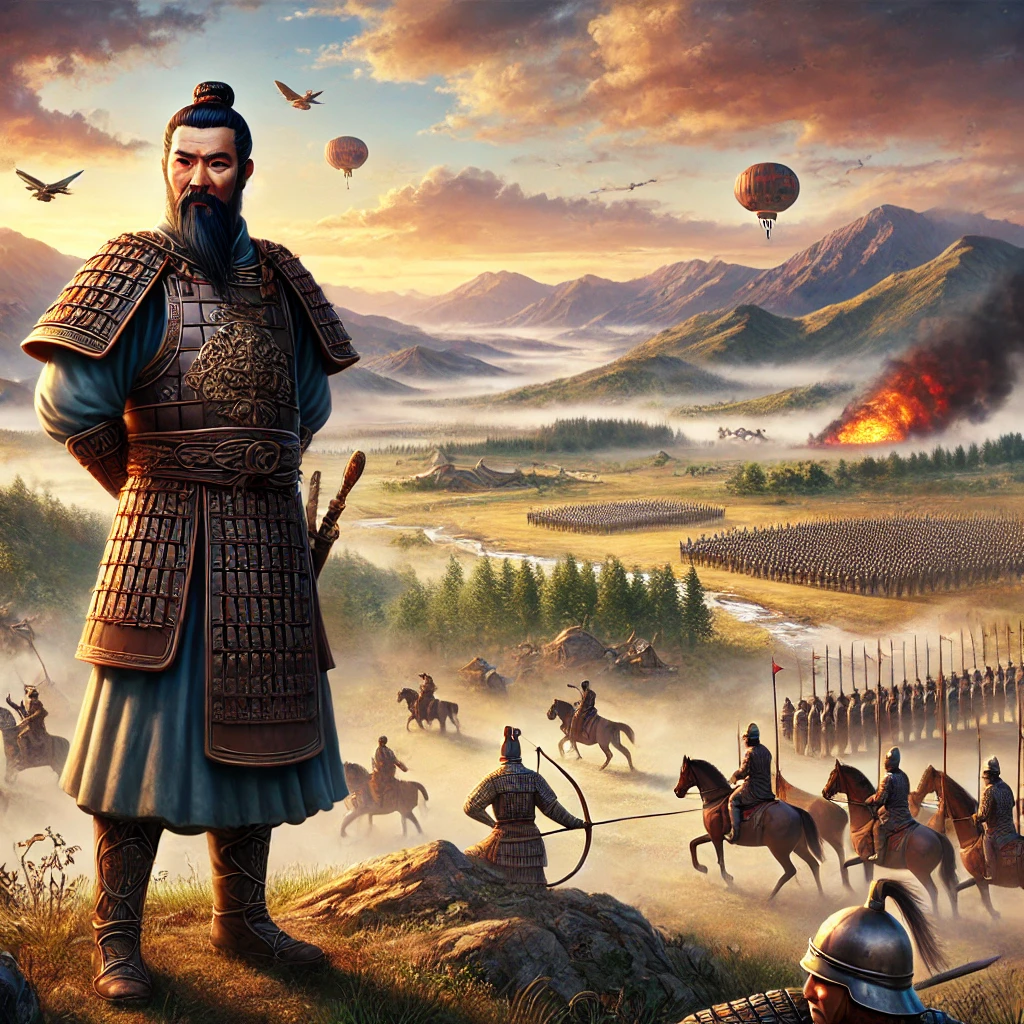“Meno” is a philosophical dialogue written by Plato, featuring Socrates and Meno as the main characters. The text delves into the nature of virtue, exploring whether it can be taught, acquired through practice, or is inherent by nature. The dialogue also introduces the concept of recollection, a cornerstone in Plato’s theory of knowledge.
Plot Summary
Meno approaches Socrates with a burning question: Can virtue be taught, or is it a gift from the gods, an inherent trait, or perhaps something acquired through practice? Socrates, in his usual manner, responds not with answers but with further questions. He confesses ignorance of what virtue truly is and asks Meno to define it. Meno confidently steps forward, suggesting that virtue differs from person to person: the virtue of a man is to manage the city, while a woman’s virtue lies in managing the household. There are countless virtues, he claims, each unique to its bearer.
Socrates challenges this notion, seeking a universal definition of virtue. He likens Meno’s response to offering a swarm of bees as an answer to the question of what a bee is. While bees may differ in appearance, they share a common nature that makes them all bees. Socrates pushes Meno to find that common nature in virtue, the essence that binds all virtues together. However, Meno struggles, unable to capture the elusive quality that makes virtue what it is.
Seeing Meno’s confusion, Socrates introduces a radical idea—the theory of recollection. He suggests that the soul is immortal and has seen all things in previous lives. Therefore, learning is merely a process of recollecting what the soul already knows. To illustrate this, Socrates summons one of Meno’s slaves, a boy with no formal education in geometry. Through a series of carefully crafted questions, Socrates leads the boy to solve a complex geometric problem. The boy arrives at the solution not through instruction but by recalling knowledge buried deep within his soul. This demonstration leaves Meno astonished and partially convinced that learning is a form of recollection.
Despite this revelation, the original question about the nature of virtue remains unanswered. Meno still wants to know if virtue can be taught. Socrates proposes a hypothesis: if virtue is a kind of knowledge, then it should be teachable. If it is not knowledge, then teaching it might be impossible. They consider whether there are teachers of virtue. Anytus, an esteemed Athenian, joins the conversation at this point. He vehemently opposes the Sophists, who claim to teach virtue for a fee, branding them as corruptors of youth. Socrates remains skeptical, noting that if there were true teachers of virtue, they would be widely recognized, just as teachers of medicine or music are.
Socrates and Meno then ponder the lives of virtuous individuals, particularly famous statesmen like Themistocles, Aristides, and Pericles. These men were undoubtedly virtuous, but were they able to pass on their virtue to their children? Socrates notes that despite being taught all manner of skills, the children of these great men did not necessarily become virtuous themselves. This observation suggests that virtue is not knowledge in the conventional sense since it cannot be systematically taught or passed down from one person to another.
As the dialogue progresses, Socrates suggests that if virtue is not teachable, it must be something akin to true opinion. Unlike knowledge, which is stable and grounded in reason, true opinion is fleeting and can guide correct action without the understanding of the underlying principles. He likens true opinion to the statues of Daedalus, which were said to be so lifelike they would run away unless tied down. In the same way, true opinions must be “tied down” by an understanding of the cause to become knowledge. Therefore, someone can act virtuously through divine inspiration or some kind of innate correct belief, even if they lack the deeper understanding that characterizes knowledge.
Socrates’ conclusion leaves the nature of virtue ambiguous. It appears that virtue is neither purely knowledge nor entirely innate. It might be a gift from the gods, a kind of divine guidance bestowed upon certain individuals. This divine gift explains why some people act virtuously without ever having been taught what virtue is. They possess true opinion, a kind of inner guidance that leads them to right action, but without the firm foundation of knowledge.
Throughout the dialogue, Socrates maintains his stance that he does not know what virtue is, and it remains an open question. The discussion, though inconclusive, offers a profound exploration of human nature, knowledge, and the possibility of learning. In the end, Socrates and Meno agree that seeking to understand virtue is a worthwhile endeavor, even if the truth remains elusive. The quest for knowledge, they imply, is itself a kind of virtue, an act of the soul striving to remember the truths it once knew.
The dialogue closes with an understanding that while they have not found a definitive answer, they have uncovered layers of complexity in the pursuit of virtue. The journey itself, marked by questioning, doubt, and a deep yearning for truth, is what brings them closer to the essence of what it means to be virtuous.
Main Characters
- Socrates: The central figure in the dialogue, Socrates questions the nature of virtue and knowledge. He believes in the idea of recollection, suggesting that learning is the process of remembering inherent truths.
- Meno: A young, ambitious man from Thessaly, Meno seeks a straightforward answer about the nature of virtue. His inability to define virtue shows the complexity of the concept.
- Anytus: A prominent Athenian, Anytus represents the traditional view that opposes the Sophists. His disdain for them highlights the conflict between different approaches to teaching and knowledge in Athens.
Theme
- The Nature of Virtue: The dialogue centers on defining virtue and determining whether it can be taught. It questions whether virtue is a singular quality or a set of diverse traits.
- Knowledge and Recollection: Plato introduces the theory that all knowledge is recollection, suggesting that the soul is immortal and has seen all things, thus knowledge is innate and “remembered” rather than learned.
- Teachability of Virtue: A key question is whether virtue can be taught. Socrates and Meno explore whether virtuous individuals can impart their virtue to others, ultimately concluding that virtue may not be knowledge.
- True Opinion vs. Knowledge: The distinction between true opinion and knowledge is crucial. True opinions can guide action effectively but lack the stability and certainty of knowledge.
Writing Style and Tone
Plato’s writing in “Meno” is characterized by a dialogical and philosophical style. The use of Socratic questioning is central, allowing Plato to explore complex ideas through a method of inquiry that encourages critical thinking. The tone is probing and analytical, with Socrates often playing the role of the humble seeker of truth, despite his reputation for wisdom. Plato employs vivid analogies and thought experiments, such as the recollection demonstration with the slave boy, to make abstract concepts more accessible.
We hope this summary has sparked your interest and would appreciate you following Celsius 233 on social media:
There’s a treasure trove of other fascinating book summaries waiting for you. Check out our collection of stories that inspire, thrill, and provoke thought, just like this one by checking out the Book Shelf or the Library
Remember, while our summaries capture the essence, they can never replace the full experience of reading the book. If this summary intrigued you, consider diving into the complete story – buy the book and immerse yourself in the author’s original work.
If you want to request a book summary, click here.
When Saurabh is not working/watching football/reading books/traveling, you can reach him via Twitter/X, LinkedIn, or Threads
Restart reading!








